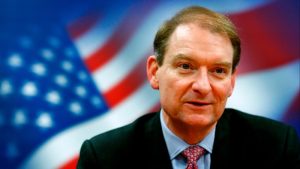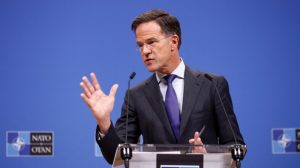What we should learn from Jimmy Carter
This article is an on-site version of our Swamp Notes newsletter. Premium subscribers can sign up here to get the newsletter delivered every Monday and Friday. Standard subscribers can upgrade to Premium here, or explore all FT newsletters
Next Tuesday will be a notable day. Not only will JD Vance and Tim Walz become the first vice-presidential candidates to debate on their feet, rather than sitting on stools (or a sofa), for the first time in more than a decade; Jimmy Carter will become America’s first centenarian former president. Carter is considerably older than the next longest-living former president, George HW Bush who made it to 94; both Gerald Ford and Ronald Reagan died at 93.
Whenever Carter does pass away, something people thought would happen last year when he moved into hospice care, he will be the first former Democratic president to die since Lyndon B Johnson in 1973. His state funeral will be a big deal. Happily, my hook for this piece is that he is turning 100. Given what we know about Carter’s tenacity, we can deduce that he is aiming to live long enough to see Donald Trump defeated again and Kamala Harris elected. It is my naive hope that the lessons we draw from Carter’s life will be the right ones.
Here in no particular order is a hit list of the wrong ones; that Carter unleashed high inflation; that he was a hopeless dove who was pushed around by the Soviets; that the malaise of the Carter years gave way to the sunlit uplands of Reagan’s; that he deserved to lose in 1980 because of the Iran hostage crisis.
First, Carter inherited high inflation from a US Federal Reserve that had been politicised by Richard Nixon. Far from adding fuel to the fire, Carter appointed the arch-inflation hawk Paul Volcker to douse inflation, thereby knowingly undermining his re-election chances. On the dovishness, nothing could be further from the truth. Carter stood up to the Soviet Union over Poland in 1980, thus not allowing a repeat of the Red Army’s 1968 invasion of Czechoslovakia or its 1956 occupation of Hungary. He also armed the Afghan mujahideen (which became controversial years later) to fight the Soviets, upgraded America’s nuclear arsenal and boycotted the Moscow Olympics.
Other than his heightened rhetoric, the only big change that Reagan made to Carter’s cold war stance was to lift the US embargo on grain exports. This redeemed a promise Reagan had made in the primaries to the good farmers of Iowa. In other words, Reagan inherited the key tenets of Reaganite foreign policy from Carter. In addition to Volcker’s hair-shirted central banking, Reagan also inherited Carter’s deregulation of key sectors of the US economy. Many of the predicates of Reagan’s 1984 re-election victory were thus laid by Carter before Reagan took office.
Finally, there can be very little doubt that Reagan’s campaign manager Bill Casey struck a deal with Iran’s ayatollahs to keep the 52 US hostages in captivity until after the election. Carter erred in approving the hare-brained Operation Eagle Claw rescue attempt. But he was nothing if not honourable in his unwillingness to risk the hostages’ lives. This caused immense frustration among his advisers, including Zbigniew Brzezinski (of whom alert Swampians will recall I’m writing a biography).
So much for the negative caricatures. One of the truest things that has been said about Carter is that he is the best ex-president America has ever had. He earned his Nobel Peace Prize in 2002 for his foundation’s work on conflict resolution, election monitoring and battling sub-Saharan African blights, including Guinea worm and river blindness. Unlike most of his successors, he never tried to monetise his status as ex-president. But the epithet of best ex-president comes with a sting because it implies that he was a bad president. Indeed, that is the potted lesson most Americans have absorbed.
This is not the place for a full evaluation of Carter’s influences on America; I want to highlight just one. His decency. When Carter was campaigning for the White House, he made the rash promise that he would never lie to the American people. The Watergate-drunk beltway media spent the next four years trying to catch him out. The best the media could do was to nail Carter on his brother Billy Carter’s misuse of his name to pursue failed business ventures. But Carter himself plausibly knew nothing of his younger brother’s antics.
That Carter’s integrity weighed on every decision he took is something that ought to be cherished. Instead, his presidency is treated as something of an embarrassment. Carter helped win the cold war, defeated inflation, initiated groundbreaking investments in clean energy years before politics took renewables seriously, and repaired America’s international reputation following the disastrous Vietnam war. But conventional wisdom long ago made its mind up. As I have written before, “The moral of Carter’s story is that virtue must be its own reward. History is a biased judge.”
Peter, you’re a student of US history. The flip implication to what I have said is that Reagan has been overrated. Do you agree?
Recommended reading
Peter Spiegel responds
Ed, I don’t disagree with you on Carter, but it’s very hard for me to make the argument that Reagan is overrated. By their very nature, two-term presidencies are more consequential than those lasting just one, and I think you may be guilty of underestimating the attitudinal change in American politics that came with the Reagan Revolution.
For those of us who spend our daily lives as journalists digging into the policy achievements (and failures) of major political figures, the cultural and societal changes wrought by those statesmen can go overlooked. But overlooking those aspects of the Reagan era would be a mistake. In some ways, Reagan’s impact on the American political scene was as much attitudinal as it was legislative.
Having lived through both the Carter and Reagan years, I don’t think the criticism of the Carter era as a hair-shirt and pessimistic is entirely unfair. Carter was a moraliser, a bit prone to lecturing and sermonising, lending his presidency the tenor of a disappointed father figure. That may have fit the moment in the immediate post-Watergate years, but by the end of Carter’s presidency, Americans were more than ready to move on.
Reagan, on the other hand, glorified American power — both economic and military — giving birth to a cultural moment that embraced freewheeling capitalism, foreign policy adventurism and pre-1960s societal nostalgia. Think Gordon Gekko, John Rambo and Indiana Jones. That cultural moment, in one way or another, is still with us, both in social and political attitudes. I don’t think Carter can claim a similar legacy.
To bring us back to Tuesday’s vice-presidential debate and the 2024 campaign, I think there’s been a close reading of these political lessons by the Harris-Walz ticket. More than Trump or Biden, it has been Harris (and Walz) who have embraced the “happy warrior” messaging that so characterised the “morning in America” themes that Reagan used with ruthless effectiveness against Carter’s heir, his vice-president Walter Mondale, in the 1984 campaign. Biden had been prone to Carter-style moralising in his dark warnings of a dystopian future under a second Trump term. Both Biden and Carter might have been right, but what Reagan taught us is that American voters sometimes need a bit of sunny optimism, too.
Your feedback
And now a word from our Swampians . . .
In response to “Dear Kamala: A letter from Pennsylvania:”
“As a foreign-born US citizen and scholar and teacher of the politics of reconciliation I see it as a political fault that Americans do not make public apologies, such as for slavery or for grievous mistakes committed in other countries. I hesitate to bring up the “model” of Europe as Europe is struggling with so many political and economic woes just now, but where would we be today without signs/policies of contritions and regret between so many countries, from France and Germany, to Germany and Poland and even between Serbia and Bosnia and Herzegovina? Yes such policies do not always ‘take’, they are not good enough by themselves, but we could have had many more Ukrainian-like wars in the past 70 years without them, especially at the end of the cold war. On the other hand, how to acknowledge mistakes made? This is the challenge and a core question for me.” — Catherine Guisan
Your feedback
We’d love to hear from you. You can email the team on [email protected], contact Ed on [email protected] and Peter on [email protected], and follow them on X at @SpiegelPeter and @EdwardGLuce. We may feature an excerpt of your response in the next newsletter
Recommended newsletters for you
US Election Countdown — Money and politics in the race for the White House. Sign up here
Unhedged — Robert Armstrong dissects the most important market trends and discusses how Wall Street’s best minds respond to them. Sign up here
#learn #Jimmy #Carter






